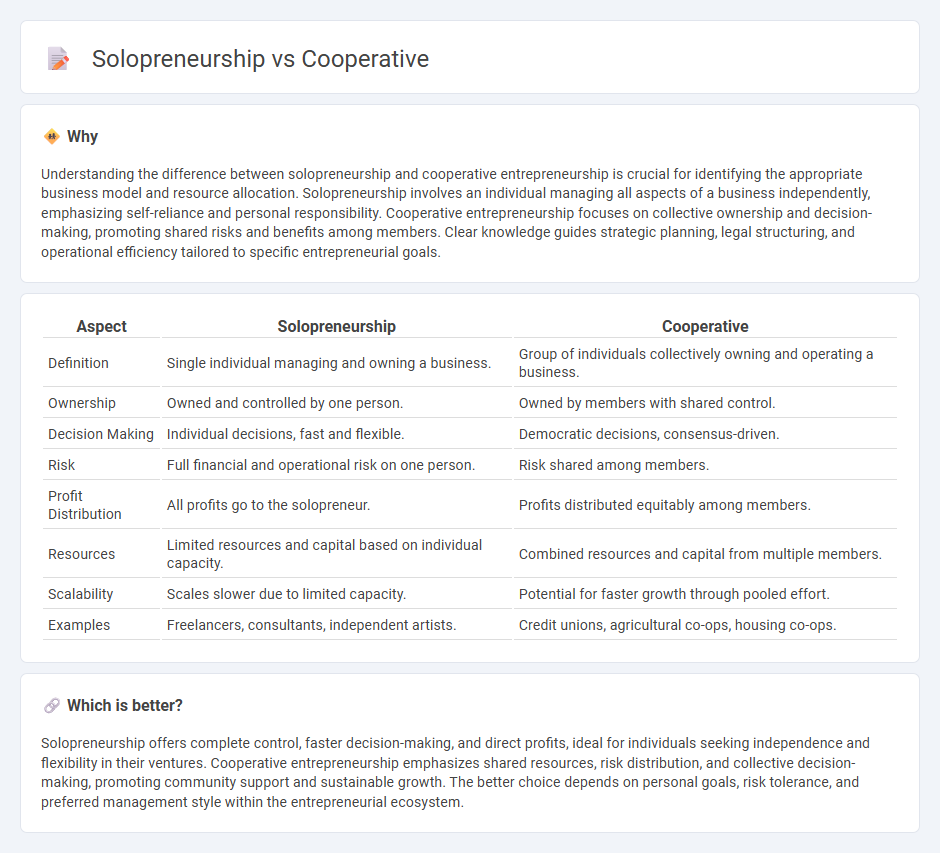
Solopreneurship involves individuals independently managing all aspects of their business, offering complete control and flexibility but requiring extensive multitasking and personal responsibility. Cooperative entrepreneurship emphasizes collective ownership and decision-making, fostering shared resources and mutual support among members, which enhances resilience and community impact. Explore the unique advantages and challenges of each model to determine the best entrepreneurial path for your goals.
Why it is important
Understanding the difference between solopreneurship and cooperative entrepreneurship is crucial for identifying the appropriate business model and resource allocation. Solopreneurship involves an individual managing all aspects of a business independently, emphasizing self-reliance and personal responsibility. Cooperative entrepreneurship focuses on collective ownership and decision-making, promoting shared risks and benefits among members. Clear knowledge guides strategic planning, legal structuring, and operational efficiency tailored to specific entrepreneurial goals.
Comparison Table
| Aspect | Solopreneurship | Cooperative |
|---|---|---|
| Definition | Single individual managing and owning a business. | Group of individuals collectively owning and operating a business. |
| Ownership | Owned and controlled by one person. | Owned by members with shared control. |
| Decision Making | Individual decisions, fast and flexible. | Democratic decisions, consensus-driven. |
| Risk | Full financial and operational risk on one person. | Risk shared among members. |
| Profit Distribution | All profits go to the solopreneur. | Profits distributed equitably among members. |
| Resources | Limited resources and capital based on individual capacity. | Combined resources and capital from multiple members. |
| Scalability | Scales slower due to limited capacity. | Potential for faster growth through pooled effort. |
| Examples | Freelancers, consultants, independent artists. | Credit unions, agricultural co-ops, housing co-ops. |
Which is better?
Solopreneurship offers complete control, faster decision-making, and direct profits, ideal for individuals seeking independence and flexibility in their ventures. Cooperative entrepreneurship emphasizes shared resources, risk distribution, and collective decision-making, promoting community support and sustainable growth. The better choice depends on personal goals, risk tolerance, and preferred management style within the entrepreneurial ecosystem.
Connection
Solopreneurship and cooperatives both emphasize autonomy and shared resources, blending individual initiative with collective support to enhance business resilience and growth. Solopreneurs often collaborate within cooperatives to access pooled capital, technology, and markets, which mitigates risks inherent in solo ventures. This synergy fosters innovation and scalability, driving sustainable entrepreneurship ecosystems.
Key Terms
Collaboration
Cooperative business models emphasize shared ownership and decision-making among members, fostering collaboration and collective growth, while solopreneurship centers on individual control and independence in business operations. In cooperatives, profits and responsibilities are distributed, promoting a supportive network that enhances innovation and resilience. Explore in-depth how collaboration shapes business success in cooperatives versus solopreneur ventures.
Autonomy
Cooperative businesses emphasize shared decision-making and collective ownership, providing members with autonomy through democratic processes and mutual support. Solopreneurship grants complete independence, with the individual retaining full control over strategies and operations, fostering personal freedom but also sole responsibility. Explore the benefits and challenges of each model to determine which best aligns with your autonomy goals.
Shared Responsibility
Cooperative business models emphasize shared responsibility among members, distributing decision-making and risk equally to enhance collaboration and mutual support. In contrast, solopreneurship centralizes accountability and control within a single individual, allowing for streamlined decisions but increased personal risk and workload. Explore the in-depth advantages and challenges of both to determine which aligns best with your entrepreneurial goals.
Source and External Links
What is a Cooperative? - A cooperative is an organization owned and controlled democratically by its members to meet their common economic, social, or cultural needs, with profits often returned to members rather than outside investors.
Cooperative - Wikipedia - A cooperative is a legal entity owned and democratically controlled by its members who use its products or services, with economic benefits distributed according to participation rather than capital invested.
COOPERATIVE Definition & Meaning - Dictionary.com - Cooperative as an adjective means demonstrating a willingness to cooperate, being helpful and accommodating to others.
 dowidth.com
dowidth.com